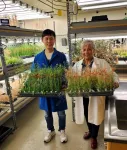(Press-News.org) Peer reviewed – observational study - humans
Genotyping technology detects Covid variants more quickly and cheaply than ever before – according to research from the University of East Anglia and the UK Health Security Agency.
A new study published today reveals that the technique detects new variants almost a week more quickly than traditional whole genome sequencing methods.
The research team say that genotyping allowed Covid variant information to be more rapidly detected and communicated to frontline health protection professionals at the height of the pandemic.
Importantly, it helped to implement local control measures such as contact tracing more rapidly.
Lead researcher Prof Iain Lake, from UEA’s School of Environmental Sciences, said: “When the Covid pandemic began, the variant with which people were infected was initially determined using a highly accurate technique known as whole genome sequencing.
“This is the gold standard diagnostic tool for identifying and genetically characterizing variants. But where large populations need to be assessed rapidly - then cost, capacity and timeliness limit its utility.
“By the start of 2021, new technology to rapidly detect new variants was being trialled by the government in NHS Test and Trace laboratories.
“The technology – known as ‘genotype assay testing’ or genotyping – allows scientists to explore genetic variants.”
Neil Bray, from the UK Health Security Agency (UKHSA), said: “We wanted to find out how this technology compares to traditional whole genome sequencing.”
The research team studied data for more than 115,000 cases where Covid variant information was available from both genotyping and whole genome sequencing.
By comparing the variant result from genotyping with the result from whole genome sequencing, they demonstrated that the genotyping results were very accurate.
Prof Lake said: “We found that genotyping was able to detect known Covid variants more quickly and cheaply that whole genome sequencing.
“They produced variant results six days faster than whole genome sequencing – with results back in just three days, compared to nine days for whole genome sequencing.
“Genotyping enabled a nine-fold increase in the quantity of samples tested for variants. This meant that variants were detected among many more people.
“Local control measures such as contact tracing could therefore happen more rapidly.
“Genotyping can be applied to finding variants in a wide range of organisms in humans and animals - so it has huge potential for guiding public health decision-making and disease control globally in future.”
Professor Susan Hopkins, UKHSA Chief Medical Advisor, said: “The world-leading genomics expertise that UKHSA and other institutions across the UK were able to draw on throughout the pandemic was critical to the UK response to COVID-19.
“Research like this will help us continue to build on our capability in this area and ensure that the UK is as well-prepared as possible to respond quickly to emerging threats to public health in the future.”
Professor Dame Anna Dominiczak, Chief Scientist for Health in Scotland who previously led the UK government’s operation to expand and run the Covid lighthouse laboratories, said: “Research such as this is really important to ensure that we build upon the huge advances in testing that occurred during Covid to bolster our defences against future pandemic threats.”
The work was funded by the UKHSA and the National Institute for Health and Care Research (NIHR) Health Protection Research Unit in Emergency Preparedness and Response.
This research was led by UEA in collaboration with the UK Health Security Agency (UKHSA), BioClavis Ltd, Thermo Fisher Scientific (US), NHS Test and Trace, the Department of Health & Social Care, the National Institute for Health and Care Research (NIHR), Alderley Lighthouse Labs Ltd, and the University of Glasgow.
‘RT-PCR genotyping assays for the identification of SARS-CoV-2 variants in England in 2021: a design and retrospective evaluation study’ is published in The Lancet Microbe.
END
How Covid variants can be detected more rapidly than ever
2024-01-18
ELSE PRESS RELEASES FROM THIS DATE:
Obsessive-compulsive disorder linked to heightened risk of death
2024-01-18
People with obsessive-compulsive disorder (OCD) may have an increased risk of death from both natural and unnatural causes than those without the disorder, finds a study from Sweden published by The BMJ today.
The researchers point out that many of the natural causes of death are preventable, suggesting that better surveillance, prevention, and early intervention strategies should be implemented to reduce the risk of fatal outcomes in people with OCD.
OCD is typically a long term psychiatric disorder affecting about 2% of the population. It is characterised ...
No benefit of physiotherapy over general advice after dislocated shoulder
2024-01-18
Routinely referring patients to a tailored programme of physiotherapy after a dislocated shoulder is no better than a single session of advice, supporting materials and the option to self-refer to physiotherapy, finds a clinical trial published by The BMJ today.
The findings should help clinicians and patients have informed discussions about the best approach to non-operative rehabilitation, say the researchers.
The shoulder is the most frequently dislocated joint, with rates highest in men aged 16-20 years ...
Concerns over new laws that could end use of Whatsapp in the NHS
2024-01-18
UK law changes pose a threat to the security of messaging apps – and therefore their use in the NHS. In The BMJ today, doctors warn that patient care will suffer if they can no longer use apps such asWhatsApp and Signal to share information.
In March 2020, in the face of the pandemic, clinicians were officially allowed to use messaging services such as WhatsApp “where the benefits outweigh the risk,” reversing years of caution about their use in patient care – provided ...
Fewer than 1% of schools in England have full policies on second languages, language learning and English
2024-01-18
A tiny fraction of schools in England – about three in every 500 – have whole-school policies which address foreign languages, English usage, and integrating students who speak English as an additional language (EAL), new research indicates.
The study of almost 1,000 secondary schools, by researchers at the University of Cambridge, questions many schools’ claims to being ‘inclusive’ spaces that value the linguistic diversity of their communities. It also suggests that language learning, and an appreciation of different languages, is being deprioritised, conflicting with Government ambitions for 90% of students to study a ...
Butterflies could lose spots as climate warms
2024-01-18
Female Meadow Brown butterflies have fewer spots if they develop in warmer weather – so climate change could make them less spotty, new research shows.
University of Exeter scientists found females that developed at 11°C had six spots on average, while those developing 15°C had just three.
The findings challenge long-held scientific views about why these butterflies have varying numbers of spots.
“Meadow Browns always have large ‘eyespots’ on their forewings, probably for startling predators,” said Professor Richard ffrench-Constant, from the Centre for Ecology and Conservation on Exeter’s Penryn Campus in Cornwall.
“They ...
Infusion of bone marrow mononuclear cells results in decreased intensive care needs and white matter preservation for children with severe traumatic brain injury
2024-01-18
After children experienced severe traumatic brain injury, the infusion of bone marrow mononuclear cells derived from the patient’s own bones led to less time spent in intensive care, less intense therapy, and, significantly, the structural preservation of white matter, which constitutes about half the total volume of the brain, according to new research from UTHealth Houston.
The study, published recently in the medical journal Brain, was based on the results of a Phase II clinical trial led by first author Charles S. Cox Jr., MD, the George and Cynthia Mitchell Distinguished Chair in Neurosciences and the Glassell Family Distinguished Chair in the ...
National award goes to Sandia Labs engineer
2024-01-18
ALBUQUERQUE, N.M. — Tony Garcia often reflects on his grandfather’s words: “Work hard and be good to people, and you’ll end up happy.”
This simple principle has been Garcia’s beacon throughout his academic and professional journeys, and now has led to his recognition with a prestigious 2023 Society of Hispanic Professional Engineers STAR of Today award for technical achievement.
The STAR awards recognize individuals in STEM who are not only excelling in their fields but also making a significant impact through their work, research ...
Researchers make links between woolly mammoths and colonization of the Americas
2024-01-17
Imagine journeying back in time to the era of woolly mammoths, some 14,000 years ago. That’s what a team of international researchers from the University of Ottawa, the University of Alaska Fairbanks, McMaster University and Adelphi University, and Indigenous scholars, managed to do. Using novel high-resolution isotope profiling (a sort of “paleo-GPS”), they were able to connect the dots between the wanderings of a woolly mammoth and the earliest known human settlements in the remote ...
Governor Hochul announces CUNY to receive $75 million from the Simons Foundation, largest donation in university history
2024-01-17
Governor Kathy Hochul today announced that the City University of New York is receiving $75 million from the Simons Foundation, the University’s largest-ever donation. The gift earmarks $50 million to establish CUNY as a hub for computational science and $25 million to support CUNY’s participation in the Governor’s proposed Empire AI project. Computational science uses programming techniques to solve problems in fields such as biology, astrophysics and neuroscience.
“For many New Yorkers, higher education is critical to pursuing a career ...
Keys to aging hidden in the leaves
2024-01-17
Scientists have known about a particular organelle in plant cells for over a century. However, UC Riverside scientists have only now discovered that organelle’s key role in aging.
The researchers initially set out to understand more generally which parts of plant cells control plant responses to stress from things like infections, too much salt, or too little light. Serendipitously, they found this organelle, and a protein responsible for maintaining the organelle, control whether plants survive being left too often in the dark.
Because they had not expected this discovery, which is ...



